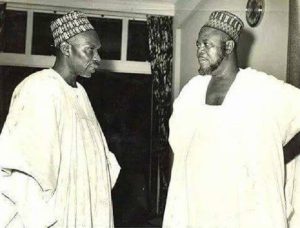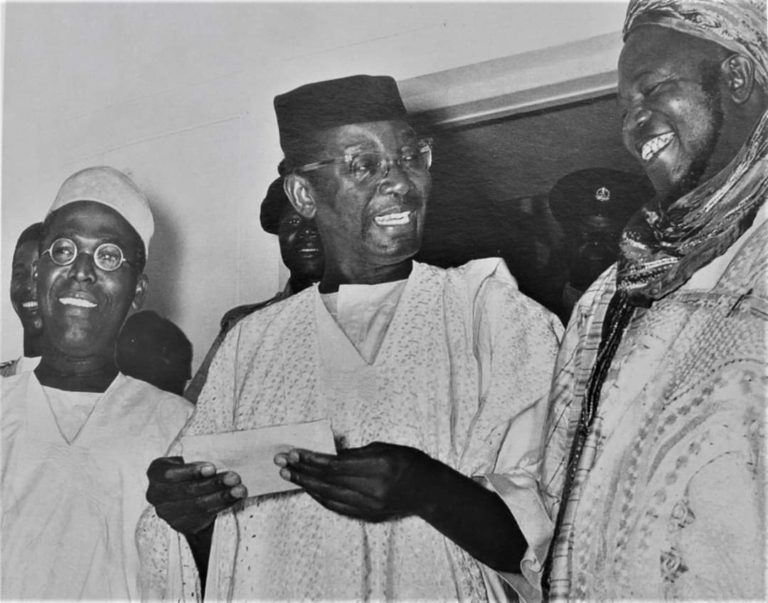
Federalism; is a multination-state response to ethno-cultural diversity, or partnership of various groups, each of which retains its distinctiveness and its right to autonomy or self-government. In this system, the country is divided into several sub-units whose borders are drawn in such a way that each of the various groups will form a local majority in one or more of the subunits. Awolowo advocated in his 1945 book among other things, the right of ethnic nationalities to “home rule”, and the introduction of federal system of government in order to unite several states that should be founded on the principle of ethnic affinity. Put succinctly by Joe Igbokwe in book, federalism is the recognition of the smallest group[i]. It is a subject in public administration concerning social justice, as discussed alongside other momentous ones in such treaties as Egyptian diplomat, Brutus Ghali’s, inside his 1973 published Tradition of the Future[ii]. The national master plan adopted by Nigerian founding fathers at Independence was true federalism. There was an agreed specific power sharing formula between the Federal and Regional Governments. Nigeria’s multi-ethnic reality, as argued by Awolowo, called for a Federal set-up which would not allow one side of the Federation to have a veto over another[iii]. The break-up of ethnically composite countries, some very powerful and prosperous, like the former Soviet Union, Yugoslavia and Czechoslovakia, took place along ethnic lines. Within Africa, the Republic of Sudan split up after decades of murderous ethno-religious conflict.
At Independence in 1960, what Nigerian founding fathers settled for was a full-blown Federal Structure, with three Regions, East-North-West as the federating units of our nation. All three regions were constitutionally equal in status. A fourth Region – the Midwest was created by regular constitutional amendment in 1963- Alongside the subsequent creation of states by abrupt military fiat in 1967 and thereafter, the democratically conceived regional option remained very much alive and soon metamorphosed into the current six geo-political zonal arrangements”. This equilibrated political zonal structural adjustment, now serving as the basis for the distribution and rotation of key national political offices, was informed by the glaring need to better accommodate the interests of the nation’s numerous ethnic groups, large or small. First military ruler of the nation, Aguiyi-Ironsi, with advice from some top civil servants, made attempts to dissolve the federation and create in its stead a group of provinces. He was later advised that federalism was a problem and that a unitary state would serve Nigeria better. Nigeria had since remained a unitary state from all intents and purposes[iv].
On September 12,1966, Nigerian Head of State, General Yakubu Gowon, had installed an Ad Hoc Constitutional Conference required to find what form of political association this great country should adopt, ruling out complete break-up and unitary form of government. Put before this committee for consideration was the Federal system with a strong central government, Federal system with a weak central government, Confederation, or an entirely new arrangement which will be peculiar to Nigeria and which has not yet found its way into any political dictionary. Although General Gowon reverted Nigeria back to a federation from September 1, 1966 by his Decree No. 59 of 1966, yet Nigeria had since then been administered substantially in the spirit of Decree No. 34 of 1966. Gowon himself, being thoroughly embarrassed by the keynote of dismemberment, of Nigeria struck in the Eastern Region, quickly abolished regionalism and retained a nominal federalism by partitioning Nigeria into 12 states that owed their every breath to the centre. Successive military governments discovered (without conceding it) that the easiest way to keep Nigeria peaceful and united is by lumping much power at the centre. They used their centralised command structure and monopoly of coercion to achieve this[v].

Half a century after Gowon’s conference, Nigeria, with its over three hundred ethnic and sub-ethnic units, brought together by the force of British Imperialism to forge a modern nation, still struggle to blend together and harmonize the various very rich but differing traditions, customs and cultures of its peoples. The recognition of the reality and socio-political significance of ethnicity was clear at the birth of an independent Nigeria in 1960. The larger ethnic units of Hausa/Fulani-Igbo-Yoruba formed the basis of the three Regions Nortn-East-West. Ethno-based agitations aimed at asserting the separate identity of the smaller groups, promptly sprouted in the three Regions. These include the United Middle Belt Congress (UMBC) Movement in the North, the Calabar-Ogoja-Rivers (COR) State Movement in the East and the Midwest State Movement in the West. The concept of six geo-political zones which subsists into the new milleneum is also ethnically based, with three zones accorded to the larger ethnic groups and, to balance them out, three also to a conglomerate of the smaller ethnic units. The lesson from this political structural arrangement is that the ethnic units are recognized and accepted as the veritable building blocks in the on-going construction work and nation building process in Nigeria[vi].
There can be no doubt that Nigeria was making more progress in national development in the early years of Independence when federalism of four semi-autonomous regions susbits with more extensive powers and responsibilities vested in the regions with free and healthy competition among the regions vying for primacy in socio-economic development of their respective domains. Those were the days of significant export of groundnuts, hides and skins, and tin ore from the North; of cocoa from the West; of rubber from the Mid-West; and of palm produce and coal from the East of Nigeria. They were also the days of such achievements as Free Universal Education in Chief Awolowo’s Western Region, of the burgeoning industrialization of Dr. Okpara’s Eastern Region and a booming cotton industry in Sir Ahmadu Bello’s Northern Nigeria.
Argument in favour of federalism Regional structure have been made by saying the Regional government provides the media – not too big and not too small instrument to cope cost-effectively with economic projects of considerable size. It is said the Central Government on the other hand, is too unwieldy and distant from the grassroots to handle certain relatively minor but important developmental details nationwide. Federalism as in Nigeria practiced five decades later is skewed to favour select communities. This, according to an account, was why they were arbitrarily created, exemplifying the contradictions of the system. That arbitrariness had encouraged many states to create local governments without the corresponding financial powers. Thus subsequently led to their conversion to area councils. Thus, reinforcing the nation’s skewed federalism will result from federally created councils[vii]. The national experience with federalism shows that the problem of marginalization is at the bottom of minority ethnic groups’ fears – fears of the curtailment or violation of substantive human rights, of the right to self-determination, the right to the promotion of their cultural rights and their citizenship rights, and especially the right to equitable participation in the cultural, economic and political life of the country[viii].
General Babangida operated a bloated presidency which effectively proclaimed the routing of federalism in Nigeria. States and local governments became increasingly dependent on the centre, which was itself dependent on oil revenues. The Presidency alone had the Central Bank and about 25 other agencies under its direct control. His government treated demands for restructuring with levity anci actually regarded tire restive minorities in tire South as mere irritants. Babangida chose to declaim at every opportunity that Nigerian Federalism is a settled issue[ix]. Not only is President Obasanjo’s meddlesomeness a violation of the federalism, it has thrown up ethical questions, which in a shared opinion, is capable of circumscribing the president’s moral authority and credentials[x].
The Supreme Court has played an invaluable role in defining the relationship between states and the federal government, thus helping to preserve the sanctity of Nigeria’s federation and fiscal federalism. Important cases decided in this regard include Attorney-General of Lagos State vs Attorney-General of the Federation and (2003) in which the court held that urban and regional planning are within the jurisdiction of states, and not the Federal Government. There was also the celebrated case of Attorney-General of Lagos vs Attorney-General of the Federation in which the court ruled that the federal government had no right to withhold allocations to any state of the federation[xi].
[i] ThisDay, July 28, 1996
[ii] AFRICA, July 1973
[iii] The News March 13, 2006
[iv] TELL November 17, 2003
[v] The Source, August 13, 2001
[vi] Guardian, December 16, 2013
[vii] Guardian, June 29, 2013
[viii] The News, December 6, 2004
[ix] The News, July 17, 1995
[x] The News, December 13, 2004
[xi] The News, March 31, 2008





















